- Blueberry seeds are the small, nutrient-rich components inside blueberries, often extracted from juice byproducts and valued for their health-promoting compounds.
- Backed by emerging scientific research, blueberry seeds offer potent antioxidant, anti-inflammatory, and metabolic health benefits.
- From cardiovascular support to skin rejuvenation and blood sugar control, these seeds are a rising star in functional nutrition and wellness.
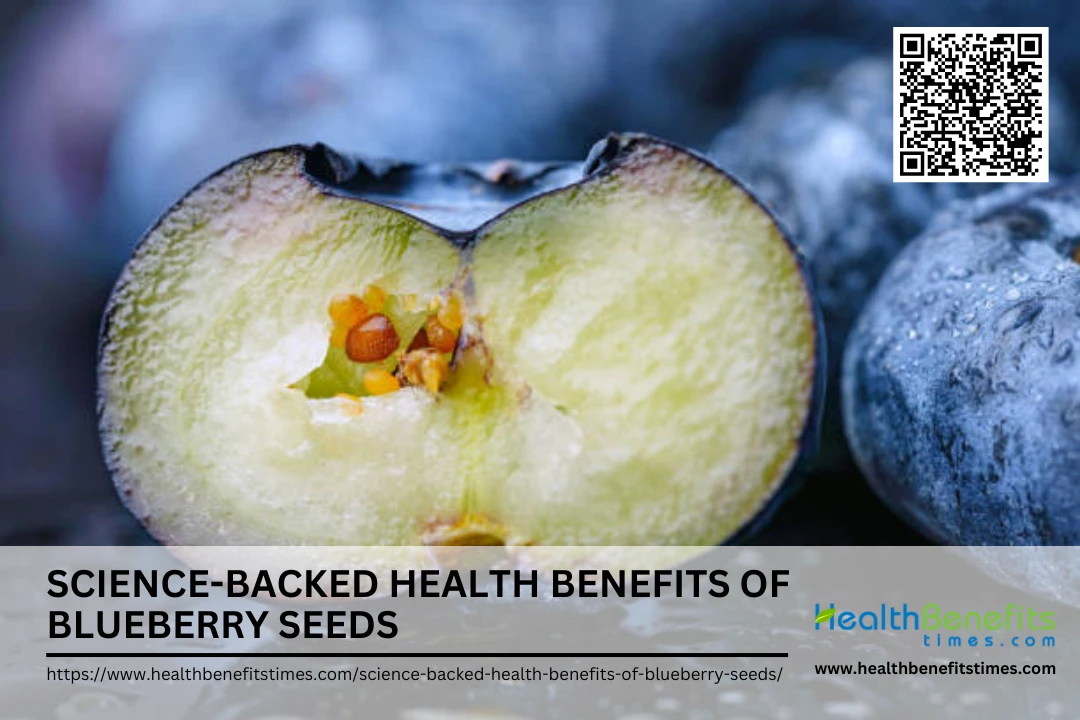 Blueberry seeds are the tiny, nutrient-rich components found within the flesh of the blueberry fruit, often discarded during juice or extract production, but now increasingly valued for their bioactive compounds and health-promoting properties (Unlocking the potential of blueberry pomace). In recent years, the spotlight on blueberry seeds has grown as emerging research uncovers their potent nutritional and therapeutic potential. Packed with essential fatty acids, polyphenols, and antioxidants, these seeds offer more than just a byproduct of juice production. They have been shown to deliver a wide range of health benefits, including anti-inflammatory, cardioprotective, and skin-enhancing properties. Studies utilizing sub- and supercritical extraction techniques have successfully retrieved valuable bioactives from blueberry seeds, which are now being used in both nutraceutical and cosmetic formulations (Recovery of valuable cosmetic ingredients). Furthermore, blueberry seed oil, rich in linoleic acid and tocopherols, has demonstrated significant promise in clinical and laboratory settings for improving skin barrier function and neutralizing free radicals.
Blueberry seeds are the tiny, nutrient-rich components found within the flesh of the blueberry fruit, often discarded during juice or extract production, but now increasingly valued for their bioactive compounds and health-promoting properties (Unlocking the potential of blueberry pomace). In recent years, the spotlight on blueberry seeds has grown as emerging research uncovers their potent nutritional and therapeutic potential. Packed with essential fatty acids, polyphenols, and antioxidants, these seeds offer more than just a byproduct of juice production. They have been shown to deliver a wide range of health benefits, including anti-inflammatory, cardioprotective, and skin-enhancing properties. Studies utilizing sub- and supercritical extraction techniques have successfully retrieved valuable bioactives from blueberry seeds, which are now being used in both nutraceutical and cosmetic formulations (Recovery of valuable cosmetic ingredients). Furthermore, blueberry seed oil, rich in linoleic acid and tocopherols, has demonstrated significant promise in clinical and laboratory settings for improving skin barrier function and neutralizing free radicals.
Key Components of Blueberry Seeds
Blueberry seeds, though tiny, are packed with essential nutrients. They contain powerful antioxidants, healthy fats, fiber, and polyphenols, making them a concentrated source of health-boosting compounds often overlooked.
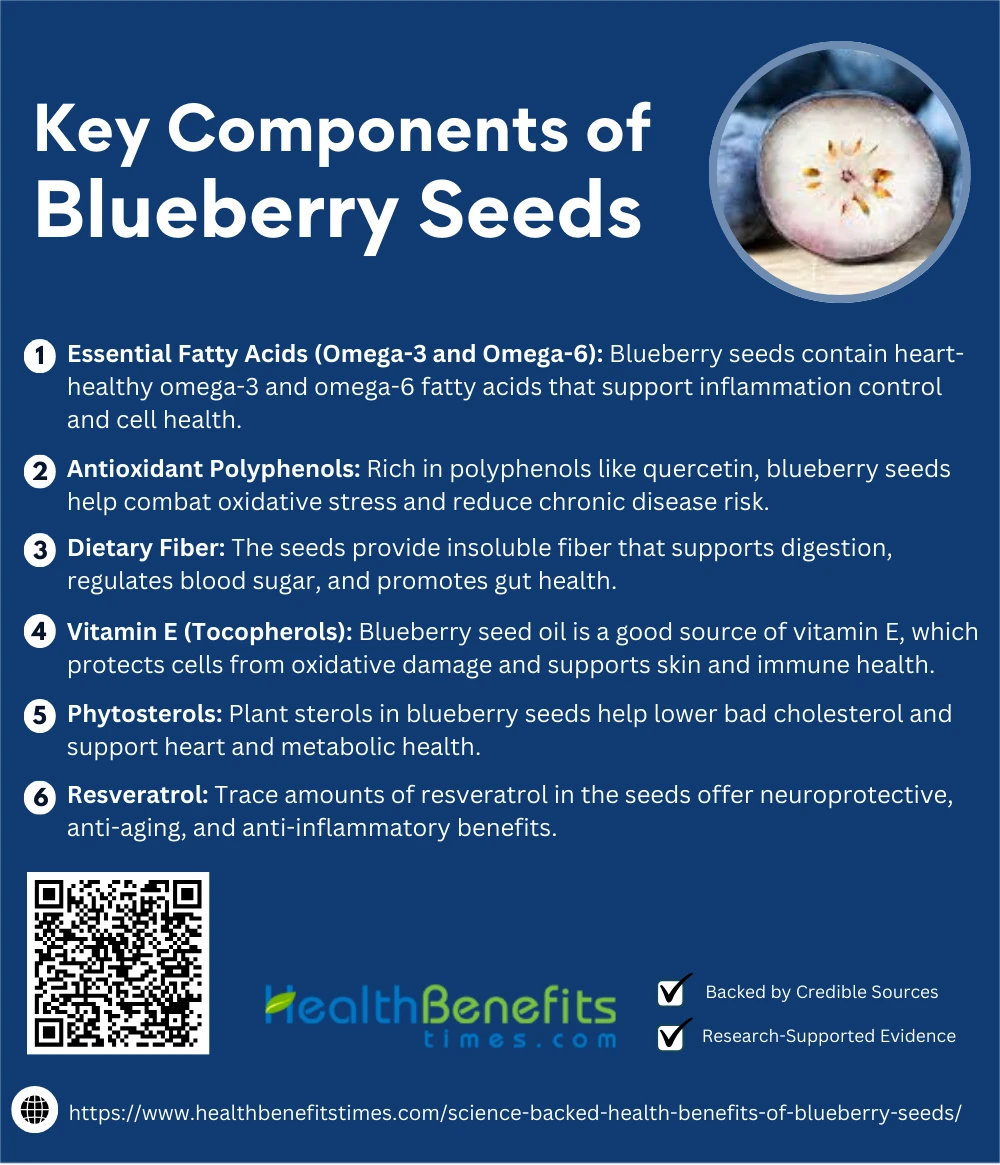 1. Essential Fatty Acids (Omega-3 and Omega-6)
1. Essential Fatty Acids (Omega-3 and Omega-6)
Blueberry seeds are a rich source of polyunsaturated fatty acids, notably alpha-linolenic acid (omega-3) and linoleic acid (omega-6). These fats play a critical role in maintaining heart health, skin hydration, and anti-inflammatory balance in the body. Their presence in seed oil contributes to improved lipid profiles and cellular membrane function.
2. Antioxidant Polyphenols
These seeds are packed with antioxidant-rich polyphenols such as quercetin, chlorogenic acid, and proanthocyanidins. These compounds combat oxidative stress and may reduce risks of chronic diseases like cardiovascular disease and cancer. Their free-radical scavenging ability supports cellular repair and systemic resilience against aging.
3. Dietary Fiber
The fibrous structure of blueberry seeds provides insoluble fiber, which supports healthy digestion, reduces constipation, and helps regulate blood sugar levels. As a natural prebiotic, this fiber also nurtures beneficial gut bacteria, contributing to improved gut microbiome diversity and metabolic health.
4. Vitamin E (Tocopherols)
Vitamin E, particularly in the form of gamma- and alpha-tocopherol, is abundant in blueberry seed oil. This fat-soluble antioxidant protects skin cells and body tissues from oxidative damage. It also plays a crucial role in immune modulation and photoprotection in dermatology applications.
5. Phytosterols
Blueberry seeds contain plant sterols such as β-sitosterol, which are structurally similar to cholesterol and help lower LDL (bad) cholesterol levels by competing for absorption in the intestines. They also have anti-inflammatory and immune-regulating properties, making them valuable for cardiovascular and metabolic health.
6. Resveratrol
Although more widely associated with the skin of blueberries, resveratrol is also found in trace amounts in the seeds. This polyphenolic compound has demonstrated neuroprotective, anti-inflammatory, and anti-aging effects. It also improves mitochondrial function and may help protect against neurodegenerative conditions.
Comparison with the flesh and skin of the blueberry
Here is a structured table comparing the key components of blueberry seeds, flesh, and skin based on their nutritional and phytochemical profiles:
| Component | Blueberry Seeds | Blueberry Flesh | Blueberry Skin |
| Essential Fatty Acids (Omega-3, 6) | High (notably ALA & LA) | Low | Negligible |
| Dietary Fiber | High (mostly insoluble) | Low (mostly soluble fiber) | Moderate (mainly insoluble) |
| Antioxidants (Polyphenols, Flavonoids) | Moderate (chlorogenic acid, tannins) | High (anthocyanins, flavonoids) | Very High (rich in anthocyanins & tannins) |
| Vitamin E (Tocopherols) | High (α- & γ-tocopherol) | Low | Low |
| Phytosterols | Present (e.g., β-sitosterol) | Negligible | Trace |
| Resveratrol | Low | Moderate | High |
| Sugar Content | Very Low | High | Low |
| Caloric Density | Low | High | Low |
| Prebiotic Potential | Moderate to High | Low | Moderate |
Key health benefits of Blueberry Seeds
Blueberry seeds offer impressive health benefits backed by science. Rich in antioxidants, essential fatty acids, and fiber, they support heart health, reduce inflammation, promote skin vitality, and aid digestive wellness.
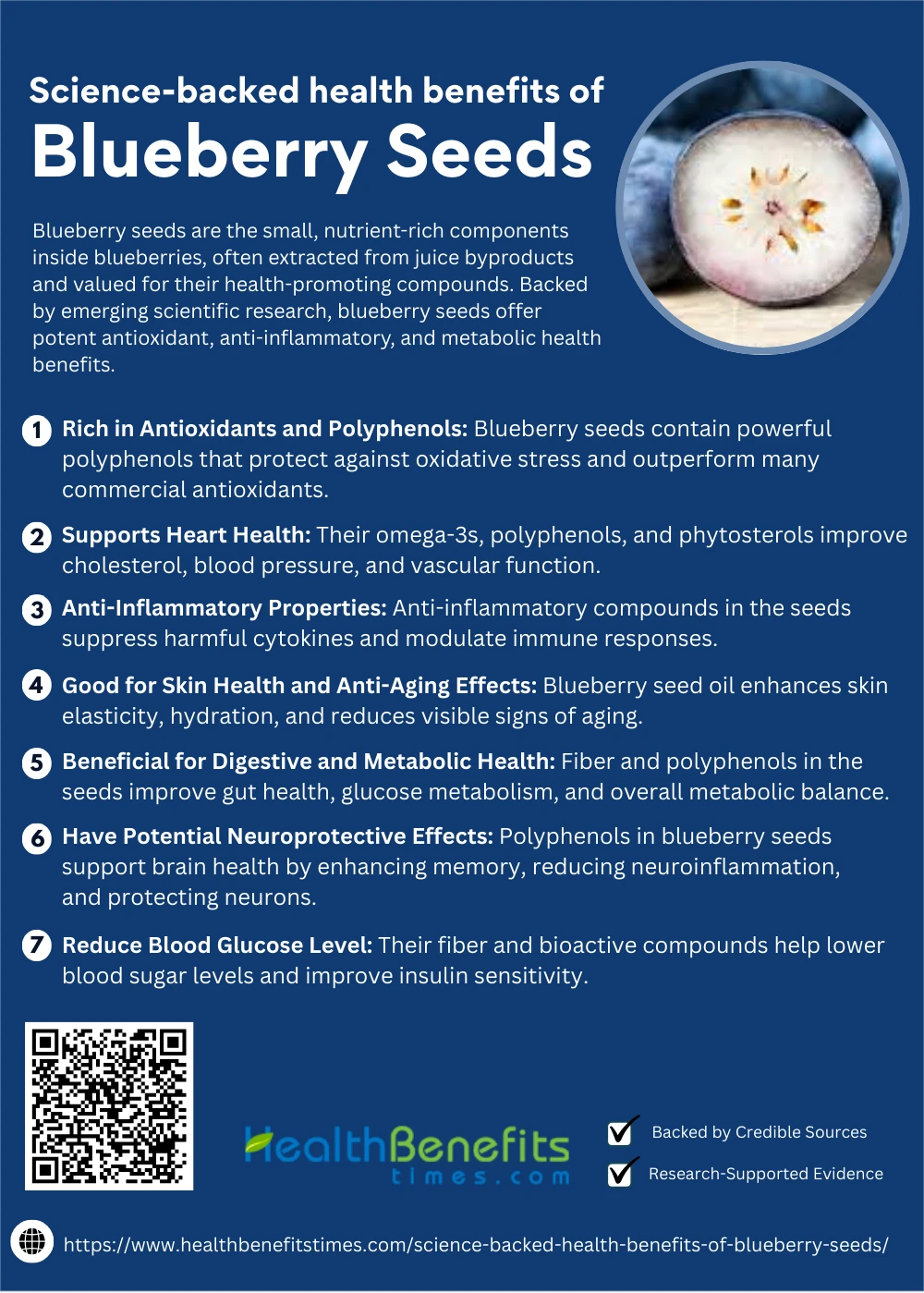 1. Rich in Antioxidants and Polyphenols
1. Rich in Antioxidants and Polyphenols
Blueberry seeds are a potent source of polyphenolic compounds that exert powerful antioxidant activity. These compounds, such as anthocyanins and chlorogenic acid, help protect cells from oxidative stress and inflammation. (1) Advanced extraction techniques have revealed high antioxidant yields from seed pomace. (2) Studies show they neutralize free radicals and outperform many commercial antioxidants, supporting applications in nutraceuticals and skincare. (3) (4) (5)
2. Supports Heart Health
Blueberry seeds promote cardiovascular wellness due to their high content of alpha-linolenic acid (omega-3), polyphenols, and phytosterols. Clinical evidence links their bioactives with reduced blood pressure and improved endothelial function. (6) They lower LDL cholesterol and arterial stiffness and enhance HDL levels. (7) (8) Antioxidants like anthocyanins also combat vascular inflammation, while linoleic acid contributes to lipid regulation. (9) (10)
3. Anti-Inflammatory Properties
Blueberry seeds are rich in anti-inflammatory agents, including polyphenols and phytosterols, which have been shown to suppress key cytokines such as TNF-α and IL-6. (11) These compounds modulate inflammatory pathways like NF-κB and enhance regulatory cytokines like IL-10. They also improve immune balance in chronic conditions and reduce oxidative damage in inflammatory sites. (8) (12)
4. Good for Skin Health and Anti-Aging Effects
Blueberry seed oil is a powerhouse for skin rejuvenation due to its high content of vitamin E, linoleic acid, and polyphenols, which combat oxidative stress and slow visible aging. (13) These compounds enhance collagen integrity and skin elasticity, while their anti-inflammatory nature helps in reducing skin irritation. (14) (15) Blueberry extract also boosts antioxidant defense on a cellular level and improves hydration and skin smoothness. (16) (17)
5. Beneficial for Digestive and Metabolic Health
Blueberry seeds are rich in insoluble fiber and polyphenols, which positively modulate gut microbiota and enhance digestive efficiency. They help balance microbial communities, boosting production of beneficial short-chain fatty acids. These bioactives improve glucose metabolism and insulin sensitivity, reduce metabolic endotoxins, and enhance lipid metabolism, while polyphenol-fiber synergy promotes long-term metabolic resilience. (18) (19)
6. Have Potential Neuroprotective Effects
Blueberry seeds, like the fruit itself, are a potent source of polyphenols that counteract brain oxidative stress and neurodegeneration. These compounds help maintain neuronal integrity and enhance memory and cognitive function. (20) Polyphenol-rich blueberry seed extracts improve neural plasticity, reduce neuroinflammation, and boost brain antioxidant capacity. (21) (8) (22) Their metabolites cross the blood-brain barrier, delivering direct neuroprotective actions. (23)
7. Reduce blood glucose level
Blueberry seeds demonstrate notable hypoglycemic activity thanks to their rich polyphenol and fiber content, which aid in regulating postprandial blood sugar levels. These compounds inhibit enzymes like α-glucosidase and modulate insulin sensitivity. Blueberry anthocyanins reduce glucose spikes and improve beta-cell function. (8) Pomace extracts support glucose homeostasis and enhance insulin signaling pathways. (24) (25)
How to Incorporate Blueberry Seeds into Your Diet or Routine
Incorporating blueberry seeds into your routine is easy and beneficial. Use their oil in dressings, add powdered seeds to smoothies or yogurt, or choose skincare products featuring blueberry seed extracts.
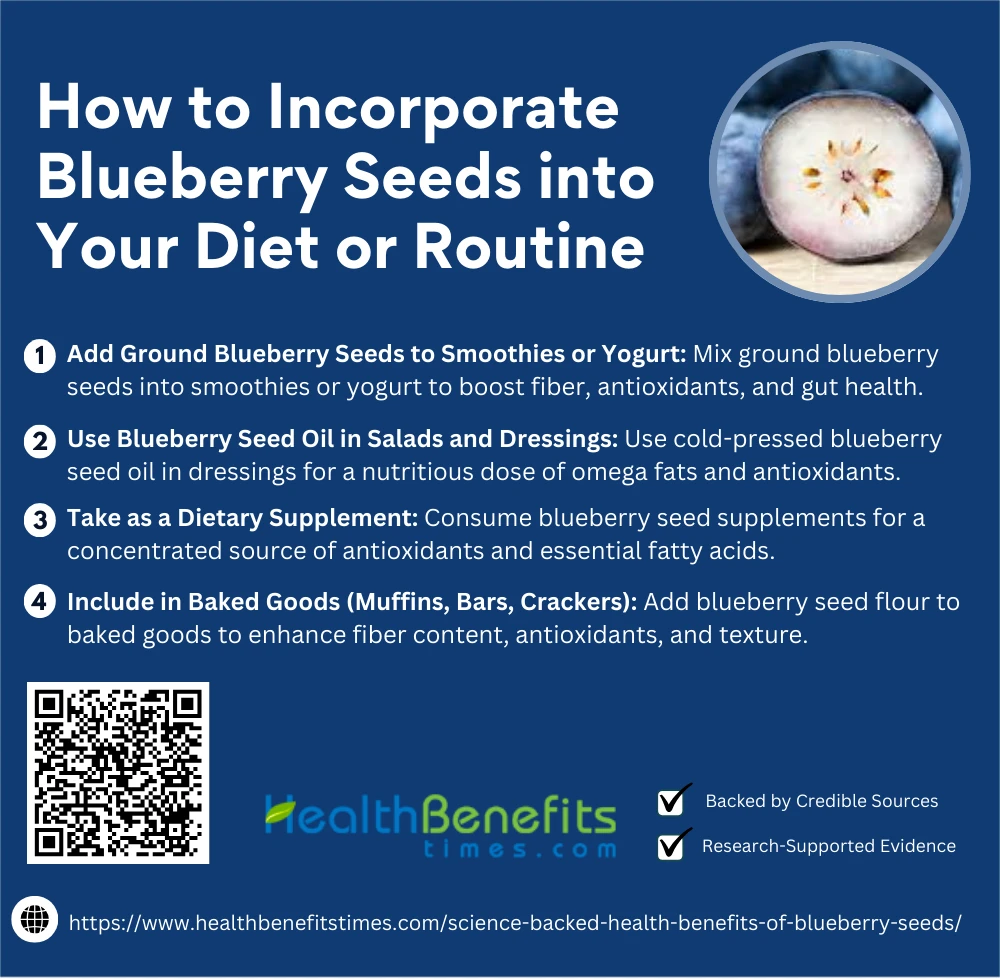 1. Add Ground Blueberry Seeds to Smoothies or Yogurt
1. Add Ground Blueberry Seeds to Smoothies or Yogurt
Adding ground blueberry seeds to smoothies or yogurt is a simple way to boost antioxidant and fiber intake. Their polyphenol-rich matrix enhances nutritional density and promotes gut health. This practice also improves anthocyanin stability in dairy and boosts antioxidant properties during storage.
2. Use Blueberry Seed Oil in Salads and Dressings
Cold-pressed blueberry seed oil offers a delicate, nutty flavor and is rich in omega fatty acids and vitamin E, making it an excellent base for salad dressings. (26) It also contains bioactive polyphenols with antioxidant benefits, and its phenolic content contributes to improved lipid stability and nutritional value in culinary applications. (27) (28)
3. Take as a Dietary Supplement (Capsules or Extracts)
Blueberry seed extract is available in capsule and oil forms, offering a concentrated source of antioxidants, omega fatty acids, and phytochemicals. These supplements support cardiovascular, skin, and metabolic health. (2) Their standardized extracts ensure consistent bioactive intake, and sub/supercritical methods improve purity and potency.
4. Include in Baked Goods (Muffins, Bars, Crackers)
Blueberry seed flour is a fiber-rich, antioxidant-enhancing ingredient ideal for baked goods like muffins and energy bars. It improves the nutritional profile and adds texture while reducing glycemic load. (29) Its polyphenols enhance antioxidant capacity and preserve sensory quality during baking. (30) (31)
Side effects of consuming Blueberry Seeds
While blueberry seeds are generally safe, excessive consumption may cause digestive discomfort in sensitive individuals. Rare allergic reactions or interactions with medications are possible, so moderation and medical advice are recommended.
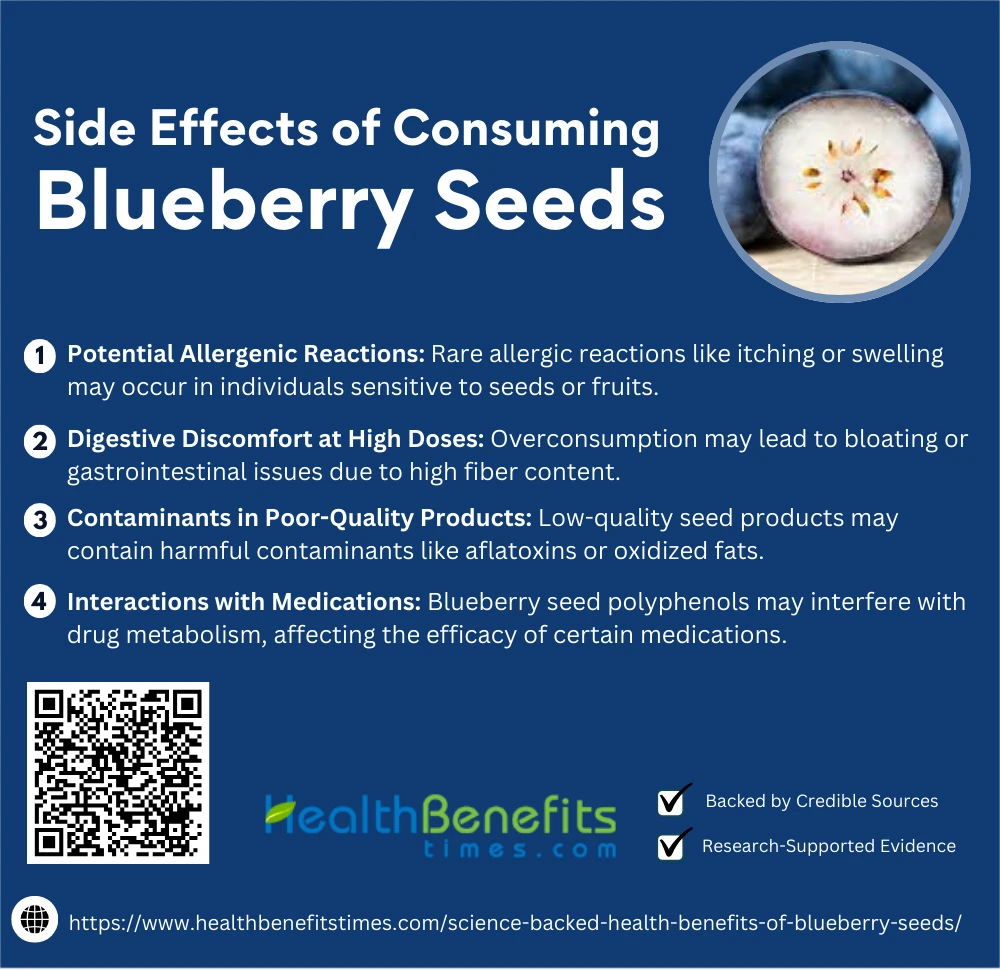 1. Potential Allergenic Reactions
1. Potential Allergenic Reactions
Though rare, blueberry seeds may trigger allergic responses in sensitive individuals, especially those with pre-existing fruit or seed allergies. Reactions can include itching, rash, or swelling. (32) Cross-reactivity has been documented among various seed oils and botanical ingredients used in supplements or cosmetics. (33) (34)
2. Digestive Discomfort at High Doses
While blueberry seeds are rich in dietary fiber, excessive consumption may cause bloating or gastrointestinal distress in some individuals. (35) High-fiber seed compounds can affect gut motility and fermentation. (36) Studies indicate that bulk-forming fiber in seeds like psyllium or blueberry may trigger symptoms in sensitive digestive systems. (37)
3. Contaminants in Poor-Quality Products
Low-grade blueberry seed oil may harbor harmful contaminants such as aflatoxins, especially when improperly stored or extracted. Studies show oxidative degradation and fungal growth can compromise product safety. (38) Aflatoxin-producing molds may affect seeds post-harvest (Badr et al., 2020), while inadequate quality control increases the risk of lipid oxidation. (39)
4. Interactions with Medications
Polyphenols in blueberry seeds may interfere with drug metabolism by affecting the cytochrome P450 (CYP450) enzyme system, leading to altered pharmacokinetics of medications like warfarin or statins. Research highlights their potential to enhance or inhibit drug bioavailability. (40) (41) (42) (43) This necessitates caution, particularly when used alongside anticoagulants or antiepileptic drugs.
Conclusion
Blueberry seeds, often discarded or overlooked, are a powerhouse of nutrients with growing scientific support for their health benefits. Rich in antioxidants, polyunsaturated fats, fiber, and polyphenols, they contribute to heart health, reduce inflammation, support digestion, and enhance skin vitality. Available in various forms—from oils to powders—they can be easily incorporated into daily routines for added wellness. While generally safe, moderation is key, and those with specific health conditions should consult a healthcare provider. As research continues to uncover more about their potential, blueberry seeds stand out as a small but mighty addition to a balanced and health-conscious lifestyle.

